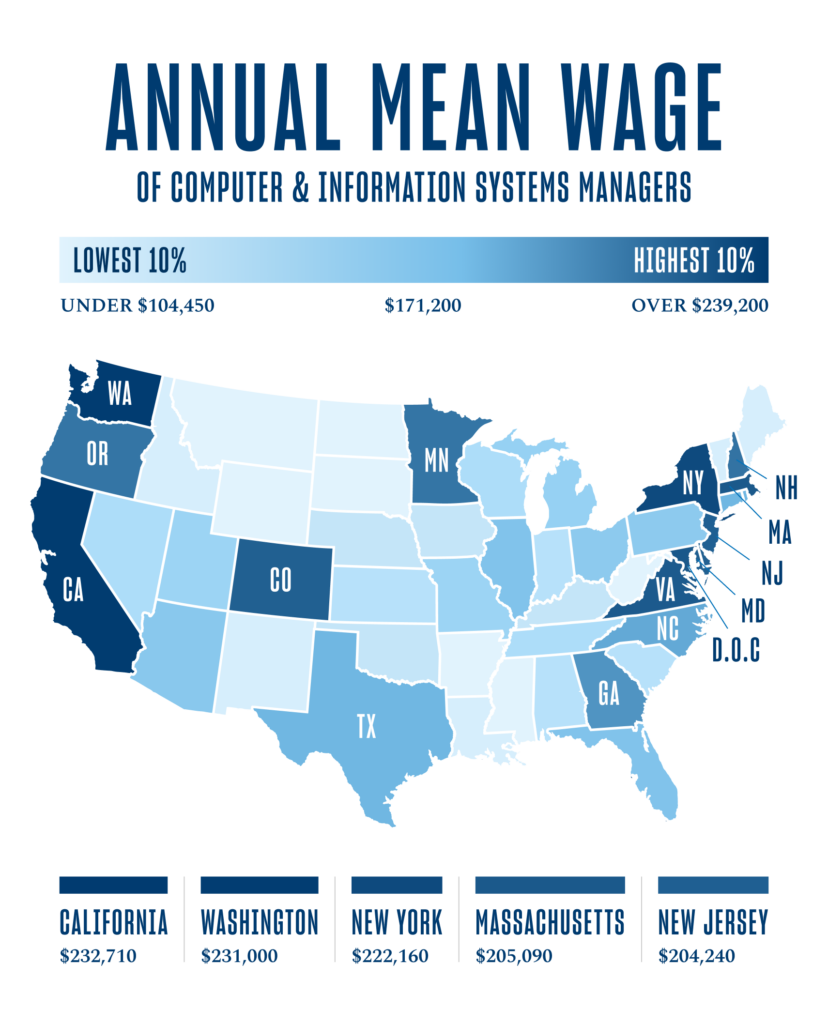If you’re looking at a possible career in information technology and are wondering how to get the most out of your experience, then you’ll want to consider the benefits of earning your master’s degree in IT.
An advanced degree can provide you with specialization within an IT field, allowing you to focus your studies and build experience in areas you find most interesting. Master’s degree programs can also build up your leadership expertise — making you a more viable candidate for senior-level positions and higher salaries.
Read on to learn more about how a master’s degree in IT can advance your career and discover which variables will most affect your salary.
Get Your Free Guide on Selecting a Master’s Degree Program that Fits Your Career: 9 Questions to Ask Before Selecting an Information Technology Leadership Master’s Degree >>
The Need for Information Technology Professionals
The demand for IT professionals remains strong across nearly every industry. The U.S. Bureau of Labor Statistics (BLS) has positive projections for information technology job opportunities as a whole, forecasting that employment from 2024 to 2034 will grow by:
- 15% for computer and information systems managers
- 15% for software developers and quality assurance analysts
- 29% for information security analysts
The growth for these computer science and IT careers is much faster than the projected 3% average annual growth for all other occupations. This translates to a projected 441,600 job openings every year across all of these positions over the next decade. While there is a lot of opportunity within the IT field, its popularity means there’s also heavy competition for positions, so it’s important to find a way that you can stand out as a candidate.
The Importance of Education When it Comes to IT Management
To stand out in today’s IT job market, you’ll need more than technical skills. Prior experience, advanced education or, ideally, both can give you an edge.
According to the BLS, many STEM roles, including computer systems analyst and computer programmer, offer higher wages to professionals with master’s degrees. Employers also increasingly prefer to hire IT managers with graduate-level education.
This is due to the growing demand for leaders who can specialize in integral areas, such as cloud computing, data analysis, cybersecurity and data storage, and understand how these systems connect within a broader business strategy.
A strong IT master’s program should deliver the technical depth and leadership skills needed to manage complex teams and projects. Depending on the curriculum, some programs also emphasize business management, a valuable asset in admin-heavy or cross-functional roles.
Popular degree paths include:
- Master of Science in Information Technology Leadership (MS-ITL)
- MBA in Information Technology
- Master of Science in Information Technology
Each option offers a different mix of technical and managerial training, but all aim to prepare you for higher-paying, leadership-focused roles.
Information Technology Management Salaries
According to the BLS, professionals who are at least 25 years old and hold a master’s degree earn a median salary of $95,680. That’s significantly more than the median for those with a bachelor’s degree ($80,236), an associate degree ($57,148) or a high school diploma ($48,360). These figures span all industries, not just tech. Nevertheless, they reflect a clear trend: Higher education often leads to higher pay and lower unemployment. This trend holds especially true when analyzing information technology master’s salary data across common roles.
For IT professionals, this can translate into stronger job prospects, greater access to leadership opportunities and higher earning potential, particularly in roles that require both technical knowledge and strategic insight.
Graduate-level IT programs, such as the University of San Diego’s MS in IT Leadership, are designed to develop that dual expertise. They prepare students to lead cross-functional teams, shape IT strategy and advance into senior roles with greater influence and compensation.
Here’s how average salaries compare across common IT roles based on education level:
| Bachelor’s Degree | Master’s Degree | |
| Web Developer | $79,000 | $81,000 |
| Information Security Analyst | $78,000 | $104,000 |
| Network Computer Systems Administrator | $86,000 | $98,000 |
| IT Manager | $89,244 | $99,520 |
| Software Developer | $91,000 | $120,000 |
Note: Salary data sourced from Payscale.com as of November 2025.
Why Information Technology Job Salaries Fluctuate
It’s important to remember that, beyond a candidate’s background and experience, salaries and job opportunities in IT can vary widely and for good reason. Three major factors drive these differences:
- Industry type
- Local market conditions (geography)
- Employer size and pay scale
For example, a recent BLS review of “Computer and Information Systems Managers” found annual mean wages ranging from just over $100,000 in lower-paying sectors to more than $300,000 in specialized, high-paying industries such as technical education and media distribution.
| Industry | Average Salary |
| Technical and Trade Schools | $300,810 |
| Media Distribution & Streaming Services | $280,270 |
| Financial Investment Pools | $277,910 |
| Semiconductor Manufacturing | $226,910 |
| Software Publishers | $210,900 |
| Management of Companies | $210,820 |
Geographic location is another major driver. In metro areas with higher costs of living and concentrated tech economies, salaries can spike well above the national average. For example:
| Metro Area | Average Salary |
| San Jose–Sunnyvale–Santa Clara, CA | $319,480 |
| Seattle–Tacoma–Bellevue, WA | $242,770 |
| San Francisco–Oakland–Fremont, CA | $238,050 |
| New York–Newark–Jersey City, NY–NJ | $224,020 |
| Boulder, CO | $219,100 |
While metro areas lead with the highest pay, some non-metropolitan regions also offer strong salaries, especially in states with growing tech infrastructure or government contracting hubs. For example:
| Non-Metro Area | Average Salary |
| South Central Tennessee | $199,640 |
| Northern New Mexico | $160,150 |
| Northeast Virginia | $159,340 |
| Northwest Colorado | $164,940 |
This shows that while major tech cities lead in compensation, remote or less-populated areas with targeted industry growth can still offer six-figure opportunities, often with a lower cost of living.

Company size and compensation structure also impact salary. Larger firms — particularly in tech, aerospace and manufacturing — often offer compensation well above industry averages. For example, recent Glassdoor data for Engineering Project Manager roles (a relevant proxy for mid- to senior-level IT leadership positions) shows median total pay ranging from:
- $121,000–$144,000 at companies including Capgemini, Jacobs and American Water
- $188,000–$227,000 at firms such as Cisco, Applied Materials and GE Aerospace
- Up to $317,000–$403,000 at top-paying employers like Google and Apple
These ranges reflect both salary and performance-based bonuses, highlighting how high-profile companies can significantly boost earning potential.
Why does this matter for your career?
Knowing where the opportunities — and pay — are strongest helps you:
- Target industries and metro areas that align with your goals
- Use advanced education (such as an MS in IT Leadership) as a tool for salary growth
- Position yourself strategically for leadership and promotion
How to Increase Your Information Technology Salary
Increasing your IT salary potential depends less on tenure and more on your ability to lead, specialize and think strategically. Whether you’re looking to advance your career or pivot into a new IT role, there are several proven ways to stand out and boost your salary.
1. Earn a Postgraduate Degree
A master’s degree can help you specialize in your chosen area and qualify for higher-paying roles:
- MBA in IT – Combines business management with a foundational understanding of programming, systems architecture and operations.
- MS in Information Technology (MSIT) – Adds business acumen and problem-solving skills to a strong technical background.
- MS in Information Technology Leadership – Designed to help professionals advance to high-level IT roles by combining technical expertise with leadership development.
It bears repeating: Professionals with a master’s degree earn, on average, over $15,000 more per year than those with only a bachelor’s, according to BLS data. That’s a substantial edge in a competitive tech job market.
2. Build IT Leadership Skills
Leadership roles in IT require more than technical know-how. Employers seek professionals who can:
- Motivate and manage teams across functions
- Translate complex technical concepts into business language
- Align IT initiatives with organizational goals
- Manage budgets and assess resource needs
- Stay ahead of emerging technologies such as AI, machine learning, cloud infrastructure and cybersecurity
- Communicate effectively with stakeholders at all levels
3. Earn Industry-Recognized Certifications
Certifications can signal your expertise in high-demand areas and help increase your value to employers. Here are a few worth considering:
Certifications can signal your expertise in high-demand areas and help increase your value to employers. Here are a few worth considering:
Security Certifications
Project & Process Management
4. Develop In-Demand Technical Skills
Beyond leadership and certifications, hands-on technical expertise remains essential in many high-paying IT roles. Skills in high demand include:
- Programming and development: Java, C#, C++, .NET, SAP
- Database administration: Microsoft SQL Server, Oracle Database
- Web development and CMS platforms: WordPress, Drupal
- Systems and network administration: Cisco, Linux/Unix, SharePoint
- Analytics and enterprise systems: Hyperion, BI tools, data visualization platforms
5. Compare Salary Boosts by Degree or Certification
Earning power in IT leadership and cybersecurity often hinges on advanced credentials. To better understand MS information technology salary trends, here’s how advanced degrees and certifications compare:
| Credential | Typical Salary Range | Key Insights |
| Master’s in IT or related field | $100,000–$135,000+ | Avg. +18% over bachelor’s; often required for senior roles |
| PMP Certification | +33% salary boost (global average) | Strong ROI; recognized across industries for project-based leadership roles |
| CISSP Certification | $112,000–$165,000+ | Especially valuable for cybersecurity leadership roles |
| Bachelor’s only | $80,000–$95,000 | Suitable for entry to mid-level roles; limited access to senior positions |
Note: Data sourced in November 2025 from Payscale.com, BLS, Ziprecruiter and PMI Salary Survey.
If you’re weighing your options, the IT master’s degree salary advantage stands out, particularly for professionals aiming to lead teams, drive innovation or transition into senior roles. Whether you pursue a degree or a certification, the key is choosing a path that aligns with your long-term career goals and offers the strongest return on investment.
Frequently Asked Questions
How much can you make with a master’s in IT?
Salaries for IT professionals with a master’s degree vary depending on the role, industry and location, but average earnings are significantly higher than those with only a bachelor’s degree. According to the U.S. Bureau of Labor Statistics, professionals with a master’s degree earn an average of $95,680 per year, compared to $80,236 for those with a bachelor’s. In IT-specific roles, master’s degree holders can expect salaries ranging from $95,000–$160,000+, especially in management, cybersecurity and software development, where the average information technology master’s degree salary can reach six figures.
How much does a master’s degree add to a salary?
On average, a master’s degree adds about $15,000 more per year in earnings compared to a bachelor’s degree, per 2024 BLS data. The salary boost can be even higher in tech fields, where advanced degrees often qualify you for senior positions, leadership roles or specialized technical work with higher compensation.
Which tech degree pays the most?
While exact salaries depend on experience and industry demand, tech master’s degrees that consistently lead to high-paying roles include:
- Information Technology Leadership
- Computer Science
- Information Systems
- Cybersecurity
- Data Science
Among these, computer and information systems managers (often with a master’s degree) earn some of the highest median wages, averaging over $170,000 in many regions and industries.
Consider Your Career Goals to Determine Your Education Path
Salary matters, but so does doing work you care about. The right degree can help you reach both.
If your goal is to move into leadership and boost your earning potential in the IT industry, consider the University of San Diego’s MS in Information Technology Leadership.
This program equips professionals to manage teams, align tech with strategy and step into high-level roles such as IT Director or Enterprise Architect, with the leadership and strategic skills today’s organizations need.
Not all IT master’s degrees are designed with leadership in mind. Find out what really matters before you commit by downloading 9 Questions to Ask Before Selecting an Information Technology Leadership Master’s Degree.



![5 Steps to Being an Innovator [and How to Innovate at Work]](https://onlinedegrees.sandiego.edu/wp-content/uploads/2022/01/5-Steps-to-Being-an-Innovator-and-How-to-Innovate-at-Work.jpeg)
